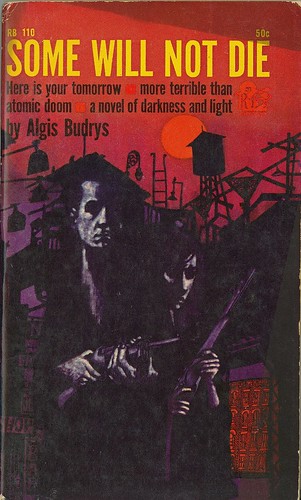Paperback, Regency, 159 pp.

Here is another book to add to the pantheon of post apocalyptic science fiction novels. Written in 1961, this novel echoes many of the fears and values of Cold War science fiction. The rebuilding of society, the inherent rights to personal freedom and the savagery of society lost are all addressed in this slim little book.
The novel prologues some 50 or more years after a plague has eradicated 90% of the population. A mercenary and his crew are taking a representative from the city state of Chicago out into the plains of the Midwest on a mission to find a legendary leader long thought dead. The story then jumps backwards to right after the Apocalypse, where we follow a young man trying to survive in the dead and empty streets of New York City. Although the population is decimated, lawlessness and savagery persist as the rule of the day. The cast of characters slowly builds as our hero first rescues, then shacks up with a young woman. His days are spent going out into the city roaming around trying to find food, ammunition, weapons. He is ever alert for snipers on the roofs and ambushes in the narrow spaces between the buildings.
Eventually, as the months go by, he makes contact with a neighbor in the same building as him, and they join together to make the nucleus of a small community. Slowly through force of personality and arms they are able to unite their building into a cohesive group. All around them similar groups are forming in coming into conflict with one another; apartment buildings and warehouses have become the armed fortresses from which marauding bands of scavengers roam Manhattan's streets. Overtime our hero's small crew becomes larger and takes over greater parts of the city. Each day is a fight for survival.
For two nights and three days, what had once been the lower half of Hell's Kitchen had been tearing itself open. From that first cold morning when they had come out of their positions and dynamited their way into a packing plant, the slap of rifle fire and the occasional bellow of heavy sidearms had swept and echoed down the cluttered streets and wide deadly avenues. Building by heavy building, they had blown gaps in walls, smashed windows and shot their way from room to room in the first rush of surprise. Here and there a fire bomb had touched off a column of smoke that twisted fitfully in the breeze and light rain that had begun falling on the second day and was still coming down. A steady stream of runners was carrying ammunition up to them and they supplied themselves from whatever miserable little they found, while scavenger squads cleaned up the weapons and ammunition left behind by corpses.
Two days, three nights. They had started on the uptown side of Fourteenth Street with covering squads to clean out the downtown side and leave them a clear supply route.
They had reached Eighteenth Street by nightfall of the third day.
The story begins to jump jerkily forward through time. The son of one of the original leaders, Ted Berendtsen, rises up as an exceptional leader and organizer. He forms an army of unification which subdues and assimilates the surrounding regions: New Jersey, Philadelphia, Boston, New England. Over the years that this great army is away, a new culture of independence begins to grow in New York with many of the same problems that plagued our pre-apocalyptic world: power, politics, money.
As the year slide by the legend of Ted Berendtsen grows but also comes to be feared by those who see him as a power monger. The new politicians of the future fear his power and put him on trial for treason. Their new Republic forces every man to be armed and reduces every interaction to a savage, Wild West-like Test of Integrity.
As we track down through the generations towards the end of the novel, the author leaves us with some question as to man's ability to recover from disaster. Will an open and cooperative society reform? Or does the daily need to battle for survival force everyone to work for themselves and their family alone?

3 comments:
Nice!
I wonder if the author fought in WWII. That passage sounds a lot like the kind of fighting that went on in villages near the end of the war.
This one looks good. but how does it all happen in such a small book?
I like the phrase, "the slap of rifle fire."
Sounds awesome.
Post a Comment